Here's What Happens When You Eat Cashews Every Day
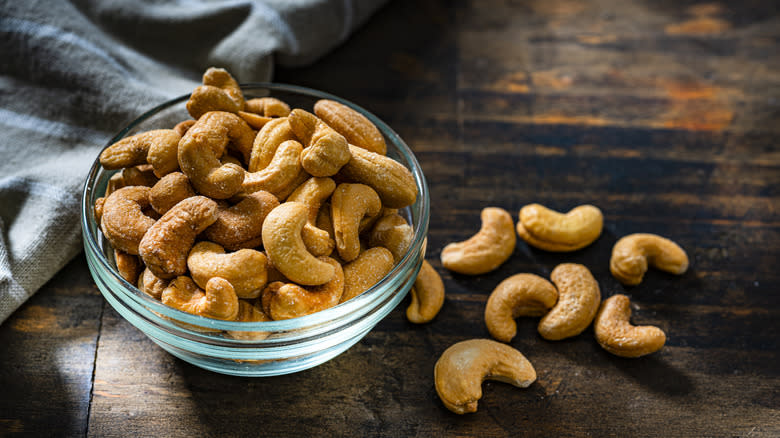
Are you one of the many people who find cashews irresistible? It's not hard to see why. In addition to being a delicious and satisfying snack, cashews are also chock-full of nutrients like potassium, magnesium, phosphorous, manganese, selenium, and vitamin K. But is this enough to justify eating them every single day?
Like most things, too much of a good thing can be bad. There are pros and cons to eating cashews every day, and it's important to eat them in the right quantity if you don't want to counteract the benefits they provide. In this article, we'll let you know how to get the most out of these nuts, as well as let you in on some secrets you may not have known about cashews. Like, for example, the fact that these "nuts" are not really nuts at all. Technically speaking, a nut is a dry fruit with a hard shell that contains a seed. Cashews, on the other hand, are actually seeds. Intrigued? Read on to find out more about that, and about what would happen if you were to start eating cashews every day.
Read more: 5 Rice Brands To Buy, And 5 To Avoid
You Spend A Lot Of Money
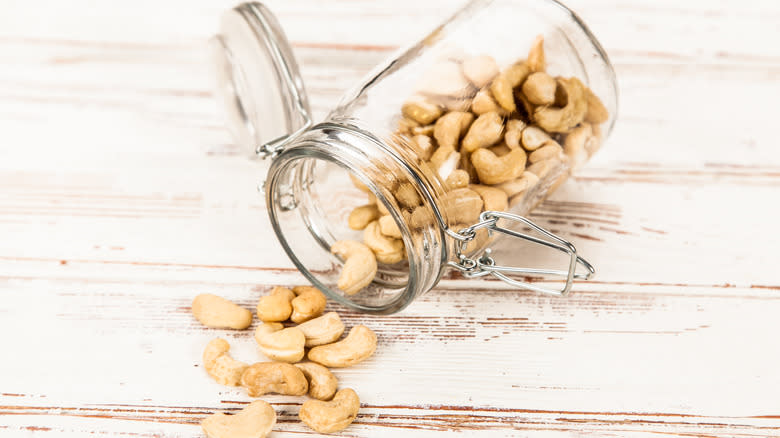
Remember how we said that cashews aren't really nuts? This is one of the things that makes them a fairly expensive snack. Cashews are technically the seeds of a "drupe" — a fruit that has a fleshy outer layer, then a hard shell that encases a seed (to help you visualize this, peaches are also drupes). But the complications don't stop there.
Cashews grow inside cashew apples, and must be extracted in order to be eaten. But this is a dangerous job, as the shell protecting the seed, a.k.a. the cashew itself, contains a toxic oil. It's the same oil, in fact, that's present in poison ivy, poison oak, and sumac (this is also, oddly enough, the reason why mangoes can make your mouth itchy) which causes skin irritation. This is why you never see cashews in shells like you do other nuts — or supposed nuts, like almonds and pistachios, which are also technically seeds.
To remove the shell from the cashew, heat must be applied. The shell is then removed and the actual cashew is extracted, packaged, and sold at a price that reflects all the hard work and risk that goes into preparing it.
You May Lower Your Cholesterol
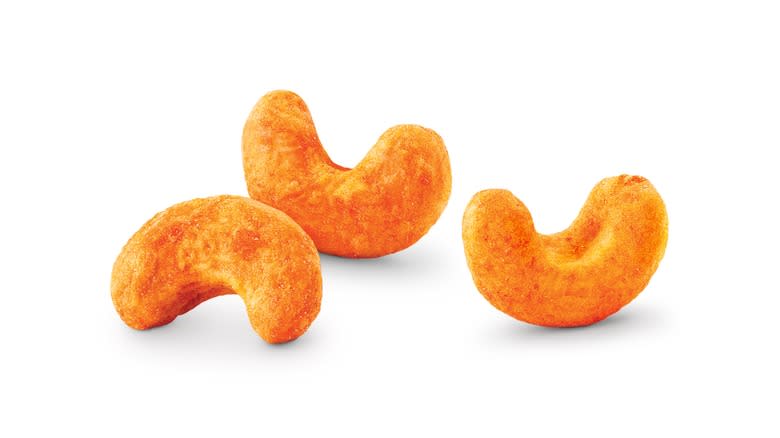
Regardless of whether or not they're really nuts, botanically speaking, cashews are the third most popular tree nut eaten in the United States. This, however, causes consternation among some crowds, because cashews are said to contain too much saturated fat to make them a beneficial part of a balanced diet (more on that later on). According to a study published by the American Journal of Clinical Nutrition, though, this is not entirely true.
This study found that snacking on cashews instead of potato chips lowered one's total cholesterol — specifically, LDL or "harmful" cholesterol — by five percent. This proves that daily consumption of a healthy amount of cashews (the suggested serving size is 1 ounce, or around 18 cashews) can actually be beneficial. So, the next time you're craving something crunchy, reaching for the cashews instead of something full of carbs would be a smarter diet choice.
You Increase Your Saturated Fat Intake
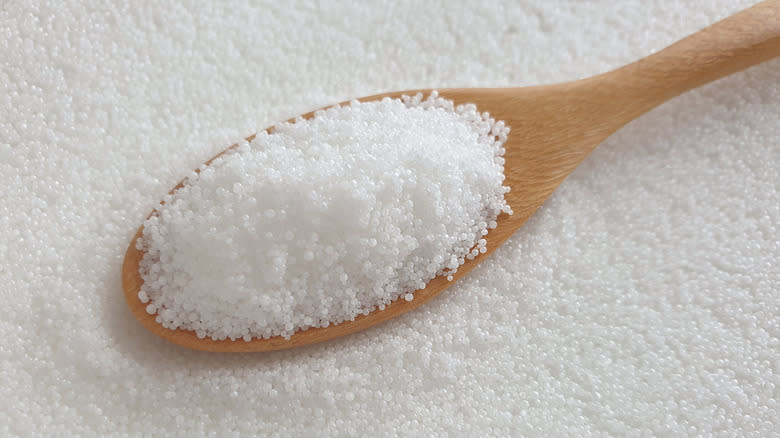
This is perhaps the biggest reason that cashews have a bad reputation, health-wise. Cashews contain 20 percent saturated fat, which disqualifies them from a health claim made by the FDA that suggests nuts can have a beneficial effect on heart health. However, there's more to this story than meets the eye.
Yes, it's true that cashews contain a significant amount of saturated fat. There is no denying that. And there is no denying that saturated fat is considered to be harmful to one's body in high amounts. But not all saturated fat is the same. A 2017 study in the American Journal of Clinical Nutrition around a third of the saturated fat in cashews is stearic acid. This is a fatty acid that doesn't have much effect at all on cholesterol, which therefore makes this less of a black and white issue. While they may technically have higher levels of fat than other nuts, taking the stearic acid factor into account makes cashews similar to other nuts when it comes to heart health.
You May Reduce Your Chance Of Having A Heart Attack Or Stroke

Cashews contain many nutrients that are great for your body. They're high in magnesium, for one thing, which can reduce your risk of ischemic heart disease, which occurs when the blood flow to one's heart is too low. Magnesium also serves to keep your heart pumping regularly, and a deficiency of it can cause heart palpitations. As if that weren't enough, that same magnesium can also help reduce the risk of hemorrhagic strokes.
Several studies have shown that regular consumption of nuts like cashews can reduce the risk of heart attack, cardiovascular disease, and sudden death by cardiac event by 30-50 percent. One study in particular, in the Journal of the American College of Cardiology, was carried out over the course of 32 years, and found that people who ate 1 ounce of nuts five or more days per week lowered their risk of coronary heart disease by 14 percent and cardiovascular disease by 20 percent. So, it seems safe to say that it wouldn't be a bad thing to eat cashews every day!
You Will Ingest A Lot Of Calories
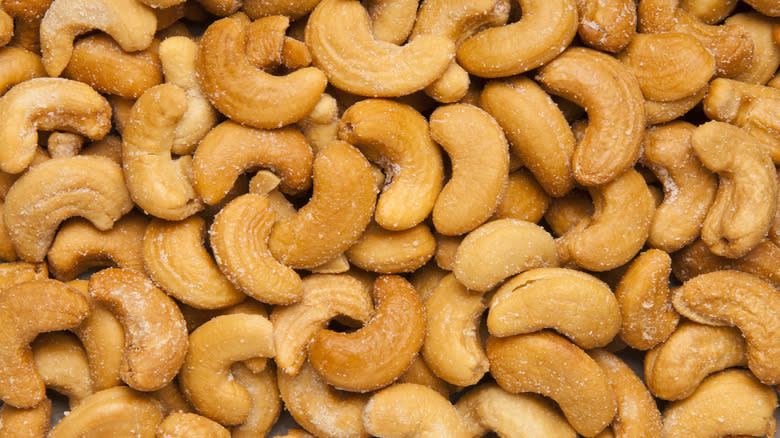
The serving size for cashews is around 18 nuts. If that sounds like an odd amount, you can think of it as either 1 ounce or around 28 grams. While that might not seem like a lot, there is a reason for that number: Calories.
Cashews may have many pros when it comes to your health, but they also have one big con in the form of caloric content. That one 18-cashew serving contains 157 calories. The recommended daily calorie intake depends on age, weight, and gender, but to put it generally, the average man needs around 2500 calories per day, while the average woman needs around 2000. This number reduces by 500 if one is trying to lose weight, so you can see how this might be an issue. Consuming more than 157 calories during just one snack time, not even a meal, can make it harder to stick within your target calorie limit each day.
You Will Get Lots Of Protein
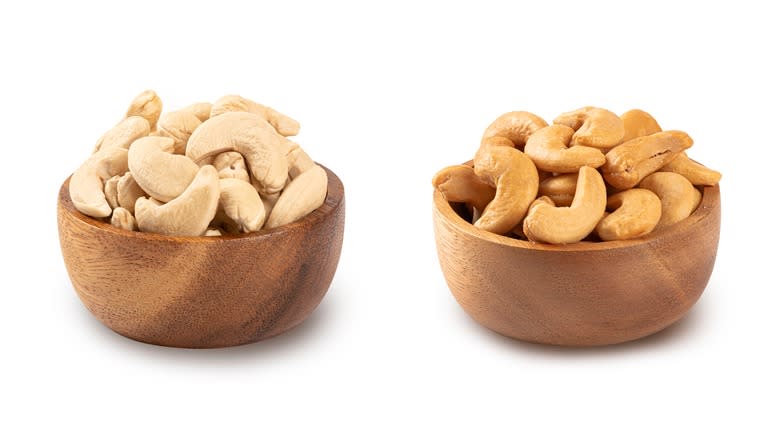
Protein is a vital part of any diet. Your body uses it to create and maintain muscle, hair, tissues, blood, enzymes, antibodies, and other things we just couldn't live without. According to Harvard Health Publishing, the Recommended Dietary Allowance (RDA) for protein is around 0.36 grams per pound of body weight. That amount goes up depending on your level of activity, whether or not you are pregnant, and other factors, but it's the bare minimum of protein you can take in per day without feeling unwell.
Cashews and other nuts are a good way to get at least some of that daily protein. In one serving of cashews, you get 5.16 g of protein. This is great news, because while many protein-rich foods like beef, pork, poultry, eggs, or milk are off-limits to vegetarians and vegans, cashews are one form of protein that doesn't come from animals.
It Won't Help Control Your Diabetes

Since cashews can be healthy when eaten in the right portion size, it stands to reason that medical professionals would want to see if they are healthy enough to help control long-term conditions like diabetes. Several studies have been done on this subject but, unfortunately, the results weren't as positive as one might hope.
A 2021 study published in Diabetes & Metabolic Syndrome: Clinical Research and Reviews found that the consumption of cashews didn't have any effect on glycemic indices at all, meaning that cashews don't help lower or maintain blood sugar levels. It also did not have any favorable effect on body weight, waist circumference, or Body Mass Index (BMI), which means that it can't help control Type 2 diabetes from that angle either.
A similar study published in the International Journal of Endocrinology and Metabolism focused on just Type 2 diabetes patients confirmed these results. This study was carried out over the course of eight weeks, during which subjects were given a daily serving of cashews. After the eight weeks was up, weight, waist circumference, and BMI were checked, as well as serum insulin and low-density lipoprotein-cholesterol-to-high-density lipoprotein-cholesterol ratio. There was no effect on the weight-related factors, but there was a reduction in both insulin and the proportion of "bad" LDL cholesterol. While this may be significant, more research is needed to come to a firm conclusion.
They May Help With Appetite Control
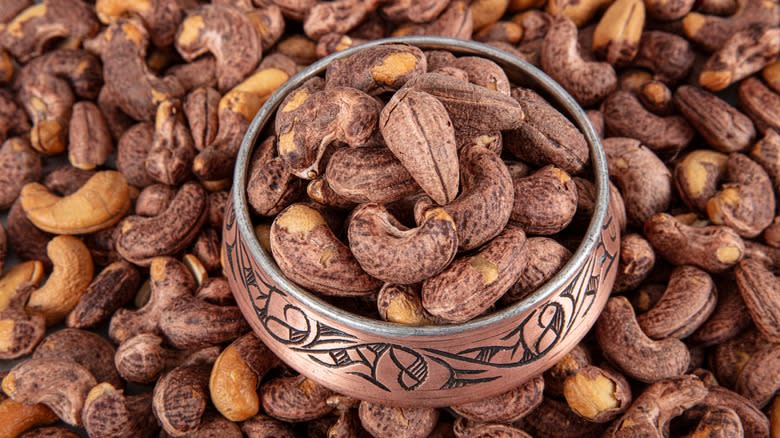
While eating cashews may not directly cause you to lose weight, they can still aid in weight control. Since cashews, like other nuts or nut-like foods, are jam-packed with protein, fiber, and healthy fats, they make for a much more satisfying snack than something like potato chips or other junk foods. They keep you feeling fuller longer, which can help get you from breakfast to lunch or from lunch to dinner without feeling the urge to snack too many times in the interim.
Many people may also find them a satisfying replacement for other, less healthy snack foods because they're crunchy and they taste good. Unlike with some other diet foods, which are eaten in small portions and may not even be something you like, you actually feel like you have eaten something substantial and pleasurable when you eat a serving of cashews. This makes them ideal for those on a diet, because they fulfill your cravings and keep you satiated without you having to force yourself to eat something you view as just a "diet food."
They May Increase Your Sodium Intake
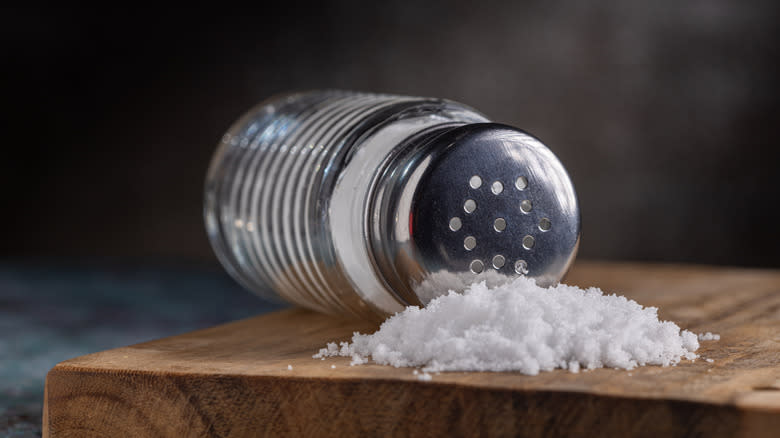
Cashews are a good replacement for fatty, over-processed snack foods like chips, and part of the reason why is because they feel like a junk food snack themselves. Unfortunately, though, sometimes they really are. If you are trying to incorporate cashews into a healthy diet or a weight loss plan, you should always choose unsalted or low-sodium cashews. Salted cashews contain around 300 mg of sodium per 100 grams, which is equivalent to 15% of the daily recommended value.
The World Health Organization recommends that adults consume less than 2000 mg per day of sodium, which is less than 5 g or 1 tsp per day. Since many of the other things we eat every day also contain sodium, it's important to read the labels to know how much you're ingesting. When it comes to cashews, luckily, there are several options that contain little or no salt at all, so this is one area where you can take control of your sodium intake.
You'll Feel More Energized

Cashews are not only delicious, but they can also help keep your energy levels up. Eating them before a workout can help you maintain your stamina throughout it, and eating them afterwards can be a good pick-me-up. If you're not into working out, you are probably still very familiar with that energy slump that comes in the afternoon when lunch is over and quitting time still seems far away. Eating a handful of cashews can perk you back up in that case as well, giving you the fuel you need to power through the rest of the workday.
But what is it that makes cashews so good at getting you charged up? For starters, they contain protein and healthy fat, which both give your body energy. They also contain copper, which serves to prevent your blood sugar from rising and falling. If your blood sugar levels aren't spiking or crashing, your energy levels stay more stable, helping you to feel more active and alert throughout the whole day.
You'll Have An Alternative To Dairy
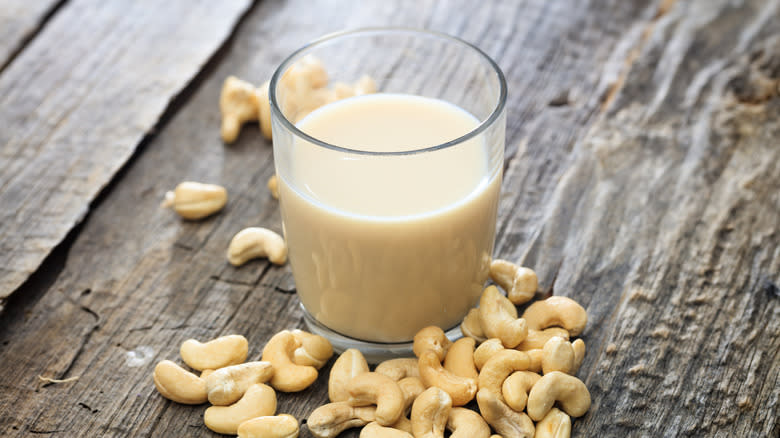
Nobody ever said that your daily serving of cashews had to be actual cashews! Cashews can also be used to make dairy substitutes. Cashew milk, for example, is a form of plant-based milk substitute that's popular among both vegans and those who are lactose intolerant.
In its purest form, cashew milk is made from just cashews and water. The cashew hulls are removed after a soak in hot water, then the seeds are soaked one more time in cold, deionized water. They're then drained, rinsed off, and mashed up to create a slurry, which is then filtered and pasteurized. That last step makes it shelf stable and last longer in the fridge after opening. Other flavors or thickeners may be added to enhance the taste or consistency, and then you've got cashew milk.
Aside from milk, one can also buy or make cashew cheese, cashew butter, cashew cream, and other cashew products to replace the dairy ones. You can even use them for classic comfort foods like vegan mac and cheese. Keep in mind, however, that almonds are often added to commercial cashew products as well, so if you are allergic to them, be sure to check the label before buying.
Your Gut Health Could Improve

Not only do cashews help you to feel satiated and therefore more likely to make smarter food choices, but they can also improve your digestive health. Due to the fiber they contain, cashews and other nuts can help combat constipation and keep things moving along the digestive tract as they should.
A study in the journal Nutrients, have also proven that cashews and other nuts can help to keep your gut healthier in general. They may increase the amount of healthy microbes (a.k.a. good bacteria) in your digestive tract, which can help you digest food better and stave off things like diarrhea and stomach cramps. However, more research is needed on this subject before a definitive recommendation can be made.
It should also be noted that while cashews may support gut health in most people, people with conditions like Irritable Bowel Syndrome (IBS) may not have the same luck. Cashews are considered to be high FODMAP foods, meaning that they contain sugars that can't get completely processed or absorbed in one's intestines. For IBS sufferers, this means that too many cashews may lead to stomach cramps, gas, and either diarrhea or constipation.
Your Brain Will Be Healthier
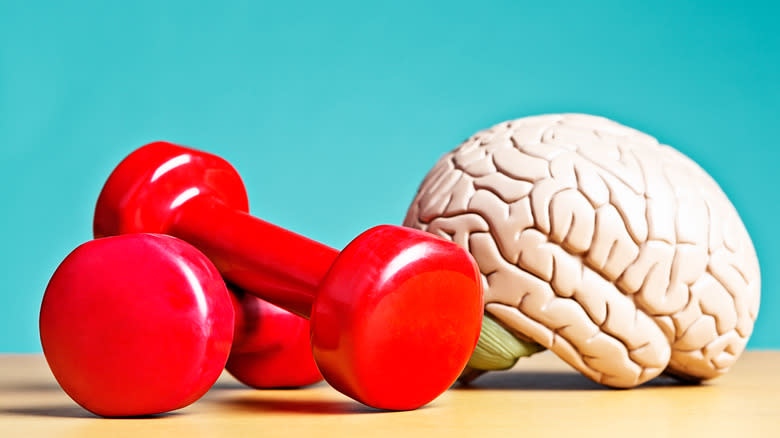
Would you believe that cashews can help reduce the risk of dementia? Cashews have high levels of both polyphenols and carotenoids, which are powerful antioxidants. Both compounds are known for their ability to reduce inflammation in the brain, but polyphenols in particular are known for lowering the likelihood of developing dementia and for improving one's cognitive capabilities in general.
Polyphenols may also boost memory and learning capabilities, meaning that not only do cashews support your brain's healthy functions, they can actually help you take them to a whole new level. Talk about "brain food!"
There is even some evidence that cashews can improve mental health and mood. They contain tryptophan and Vitamin B6, which the brain uses to create the mood stabilizing neurotransmitter, serotonin. The magnesium in cashews also helps to keep the nervous system healthy and reduce anxiety and depression. Roasted cashews are particularly good for this, and have a delicious flavor that will make it even easier to give yourself this brain boost every day.
Read the original article on Daily Meal

 Yahoo Sports
Yahoo Sports 
